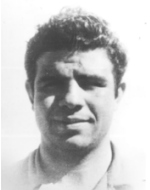Shloach, Moshe (Musa)
Son of Aliza and Jacob, was born in 1926 in the Jewish quarter of Damascus, the capital of Syria, which was then under the French mandate. He began to study at an Alliance school where most of the subjects were taught in French, but he was given lessons in Hebrew and Arabic, and was known as a diligent and diligent student, who at the age of 13 was also orphaned and forced to stop his studies and work as a boy He later joined the “Ha – Po’el” sports association and the He – Chaluts ha – Tsa’ir youth movement, And the youth movement learned Hebrew, Hebrew songs and folk dances, and prepared to immigrate to Eretz Israel in June 1942. In June 1942, Moses immigrated to Eretz Israel by his friends in an illegal way, and upon his arrival he joined Kibbutz Afikim, Where he was already a group of senior members of the Hechalutz Hatzair youth movement in Damascus, and three months later he moved to Aliyat Hanoar in Meir Shfeya, where he studied and worked, The group returned to Afikim and united with the group of “Tehran children” to “Youth of the Lord.” On June 16, 1946, he took part in the explosion of the El Hama bridge in the north of the country and in the autumn of 1946 was one of the first settlers in the new kibbutz Hatzerim In the northern Negev, in addition to his contacts with the Arabs in the area, helped him acquire the land and helped him to learn the Arabic language and his knowledge of the way of life of the neighbors. 1947 on the Partition Plan. He played this role with great success, sometimes going out with friends in Bedouin dress for tours in and around Be’er Sheva, and for this reason the enemy sought his life and even set a reward for his head. On September 19, 1948, Mosse was called to meet with an informer around the farm. When he approached the scene, mounted on his mare, he was shot from ambush and killed. He was 22 years old. He was laid to rest at a military ceremony at the cemetery in Kibbutz Hatzerim. Moshe was the first to be buried in the kibbutz cemetery. He left two brothers in Damascus, who immigrated to Palestine in 1972. His kibbutz Hatzerim published a pamphlet in his memory containing the words of his friends.
